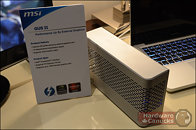Tuesday, January 10th 2012

MSI Z77 Motherboards and Next-Gen GUS Pictured
MSI showed off its upcoming socket LGA1155 motherboards based on Intel's Z77 chipset, designed to accommodate next-generation "Ivy Bridge" Core processors out of the box. Like many other motherboard manufacturers with similar motherboards on display, MSI's Z77 motherboards lack the final designs of their typically fancy-looking heatsinks over the chipset and VRM, and make do with basic ones that get the job done, and more importantly, let visitors take a look at the components in use more closely. MSI displayed two motherboards, the mid-range Z77A-GD65, and premium Z77A-GD80.
The Z77A-GD80 is designed for gaming PCs with up to two graphics cards, with a strong CPU VRM. The CPU is powered by a 14-phase VRM, complete with SFC chokes, compact DrMOS, and server-grade capacitors. There are three long PCIe slots on the board, but it appears like only two of the three are wired to the CPU, the third one to the Z77 PCH. Those two slots are PCIe 3.0 capable. SATA ports include four 6 Gb/s capable ones. The USB 3.0 front-panel header is angled like the SATA ports. Other connectivity includes Intel Thunderbolt, USB 3.0, display connections that include DVI, D-Sub, and HDMI; 8-channel HD audio, GbE, and eSATA.The Z77A-GD65 is the more affordable board. It uses a simple 9-phase VRM to power the CPU, but has the same expansion slot layout as the GD80, with two PCIe 3.0 x16 (x16/NC or x8/x8), one PCIe 2.0 x16 (x4, wired to PCH), and four PCIe 2.0 x1. It even has the same number and kind of SATA ports. Its connectivity might lack Thunderbolt.
MSI also showed of GUS (graphics upgrade system), an external graphics card enclosure. This box connects to a host PC/Mac using Thunderbolt (essentially PCIe 2.0 x4), and internally has a PCIe x16 slot and related power delivery circuitry. It draws power from an external source.
Source:
HardwareCanucks
The Z77A-GD80 is designed for gaming PCs with up to two graphics cards, with a strong CPU VRM. The CPU is powered by a 14-phase VRM, complete with SFC chokes, compact DrMOS, and server-grade capacitors. There are three long PCIe slots on the board, but it appears like only two of the three are wired to the CPU, the third one to the Z77 PCH. Those two slots are PCIe 3.0 capable. SATA ports include four 6 Gb/s capable ones. The USB 3.0 front-panel header is angled like the SATA ports. Other connectivity includes Intel Thunderbolt, USB 3.0, display connections that include DVI, D-Sub, and HDMI; 8-channel HD audio, GbE, and eSATA.The Z77A-GD65 is the more affordable board. It uses a simple 9-phase VRM to power the CPU, but has the same expansion slot layout as the GD80, with two PCIe 3.0 x16 (x16/NC or x8/x8), one PCIe 2.0 x16 (x4, wired to PCH), and four PCIe 2.0 x1. It even has the same number and kind of SATA ports. Its connectivity might lack Thunderbolt.
MSI also showed of GUS (graphics upgrade system), an external graphics card enclosure. This box connects to a host PC/Mac using Thunderbolt (essentially PCIe 2.0 x4), and internally has a PCIe x16 slot and related power delivery circuitry. It draws power from an external source.



9 Comments on MSI Z77 Motherboards and Next-Gen GUS Pictured
Yeah, VGA should be dead already. I'm still on a VGA monitor but I have a DVI to VGA adapter.
Besides, 99% of computers...scratch that...100% of non Apple-made laptops lack thunderbolt, so it will take some time before it gets any market.
Otherwise, nice looking boards.